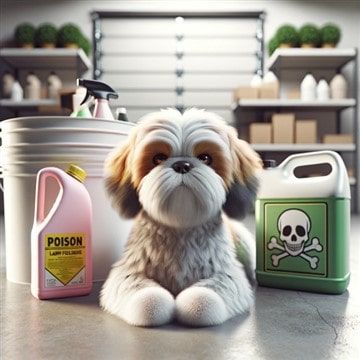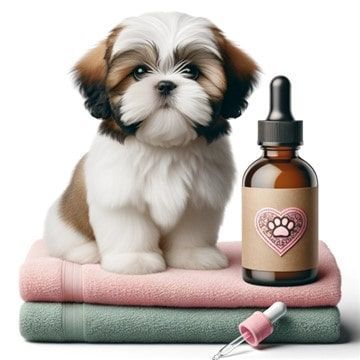Shih Tzu Poisoning Information
Overview
This article provides essential information on poisoning in Shih Tzu dogs, covering top concerns, how to react in an emergency, signs to watch for, and preventive measures to keep your Shih Tzu safe. Organizations like the ASPCA, Pet Poison Helpline, and the AAHA (American Animal Hospital Association) highlight the importance of poison awareness every March, and pet parents should be well-versed in this information year-round. Join us in taking proactive steps to protect your sweet Shih Tzu from common and not-so-common toxic threats.
Please note: AllShihTzu is reader-supported, and some of the product suggestions on this page are affiliate links. As an Amazon Associate we earn from qualifying purchases. This is at no extra cost to you and helps keep this site running.
Shih Tzu Safety: Understanding the Risks of Common Poisons
The ASPCA's Animal Poison Control Center (APCC) identifies the most frequent culprits behind pet poisonings, underscoring the need for vigilance among pet parents:
#1 OTC, Prescription and Veterinary Medications

Medications, including over-the-counter (OTC) drugs (16% of APCC calls), prescriptions, and veterinary formulas, are significant poisoning risks for pets. Small breeds, like the Shih Tzu, are highly susceptible, often ingesting these substances from dropped pills or accessible storage.
OTC dangers include Ibuprofen and Naproxen, toxic to dogs; Acetaminophen, which causes liver failure; and harmful decongestants and Vitamin D. Prescription meds also pose risks; commonly ingested Rx meds are ADHD treatments leading to seizures, antidepressants causing lethargy or heart issues, benzodiazepines and sleep aids inducing severe lethargy or agitation, and beta-blockers being life-threatening in small doses.
Veterinary medications account for 10% of poison control calls, with palatable flavors leading to potential overdose. Incorrect dosing by pet parents can result in anything from
gastrointestinal upset to severe organ damage.
#2 Human Food including Chocolate

Despite awareness of the risks, about 15% of calls to the APCC involve dogs ingesting harmful human foods, including an average of 60 daily calls about chocolate alone. Small breeds like the Shih Tzu are especially vulnerable, often finding such foods on unattended plates, accessible countertops, or in the trash. Even well-intentioned owners can mistakenly offer harmful treats.
Notably dangerous is Xylitol, found in sugar-free products, which can cause hypoglycemia and liver failure in dogs. Grapes and raisins pose risks of kidney failure, while garlic and onions can lead to anemia. Chocolate, especially dark and baking chocolate, is particularly toxic, potentially causing seizures and heart problems.
#3 Household Cleaning Products

Surprising to many, household items like liquid cleansers and paint lead to about 8% of calls to the APCC. These items can poison dogs through ingestion, skin contact, or inhalation. Bleach, disinfectants, and laundry detergents, if ingested, can cause severe gastrointestinal issues, respiratory distress, and chemical burns.
Skin exposure or inhalation of these substances in Shih Tzu puppies and dogs can result in dermatitis or breathing problems. While less common, paints and solvents pose risks of neurological issues from inhalation. A Shih Tzu exploring fresh paint or open cans may ingest or inhale dangerous chemicals. Hand sanitizers and alcohol-based cleaners, too, can cause vomiting, diarrhea, and potentially fatal alcohol poisoning by depressing the central nervous system.
#4 Rodenticides and insecticides

Rodenticides and insecticides are formulated to attract and eliminate pests, yet can inadvertently appeal to pets, particularly small dogs like the Shih Tzu, due to their curious nature and the enticing scents or flavors added to make them attractive to rodents and insects. A Shih Tzu might gain access to these toxins by finding bait stations placed on the ground or by chewing into packages left within reach in garages, sheds, or even in outdoor areas.
It's vital to note that some insecticides can be toxic to dogs even if they are merely licked and not ingested. This is because many contain chemicals that can be absorbed through a dog’s mucous membranes.
The most commonly ingested rodenticides contain anticoagulants, which prevent blood from clotting, leading to internal bleeding. Other types include those that affect the nervous system, causing seizures or muscle tremors.
Insecticides can inhibit cholinesterase, an enzyme essential for normal nerve function, resulting in excessive salivation, muscle tremors, seizures, and potentially death.
#5 Toxic Plants

Toxic plants are a real danger to pets, accounting for about 8% of calls to the APCC. Small dogs, including the Shih Tzu, often explore plants out of curiosity, leading to potential risks both indoors and outdoors. Indoors, they might nibble on houseplants within reach, while outside, they're exposed to various garden plants.
Critical offenders include lilies, which can cause kidney failure, and Sago Palm, leading to vomiting, liver failure, and seizures. Tulips and hyacinths may trigger severe gastrointestinal issues and depression, while aloe, while topically beneficial, can cause vomiting and diarrhea if ingested. Azaleas and rhododendrons can lead to symptoms as severe as coma. With over 1,000 plants toxic to pets, it's crucial to monitor what your Shih Tzu has access to.
#6 Garden Products

Garden products, particularly fertilizers, pose a unique risk to pets, notably small dogs. Canines are drawn to fertilizers containing bone meal, blood meal, and feather meal, with some finding these organic materials irresistible. Shih Tzu dogs might come into contact with these if bags are improperly stored or if products are applied in areas they frequent, like yards or gardens.
The most common garden items ingested by dogs are fertilizers, mulches, and insecticides. While many fertilizers usually aren't deadly, they can lead to gastrointestinal issues or even pancreatitis, particularly due to the high-fat content in bone meal. Cocoa mulch is particularly dangerous, as it contains theobromine (the same harmful substance found in chocolate).
Common Signs and Symptoms of Poisoning and Toxicity
Recognizing the signs and symptoms of poisoning and toxicity in dogs is crucial for timely intervention and treatment.
Time of Onset: How long it takes for a Shih Tzu to start showing symptoms depends on the type of poison or toxin and the amount ingested or inhaled; it can range from mere minutes to several hours.
Ingested Toxins:
- Gastrointestinal Issues: Vomiting, diarrhea, excessive drooling, and loss of appetite.
- Neurological Signs: Seizures, tremors, lethargy, and disorientation.
- Internal Effects: Abdominal pain, changes in urination or thirst.
Inhaled Toxins:
- Respiratory Distress: Difficulty breathing, coughing, sneezing, and nasal discharge.
Contact Toxins (Skin Exposure):
- Dermal Reactions: Redness, itching, swelling, sores, and hives.
Immediate Actions for Suspected Poisoning
React swiftly if you suspect your Shih Tzu has ingested a toxic substance. Initial steps include:
- Removing your Shih Tzu from the vicinity of the poison.
- Gathering all evidence related to the suspected poisoning, including remnants of the substance, packaging, etc.
- Observing your Shih Tzu’s behavior and breathing, even if no symptoms are apparent yet.
- Refraining from home remedies or inducing vomiting without professional advice.
- Contacting a veterinarian or a 24/7 pet poison helpline immediately. See below.
Tips:
If you’re undecided what to do: Please remember, it’s always better to be safe than sorry. With any suspected accidental poisoning do not delay in contacting your Shih Tzu’s vet or a pet poison hotline asap, even if you think they are okay, since it can take up to hours for symptoms to be severe, yet treatment may need to be started right away.
Have Phone Numbers Saved: Save the ASPCA Animal Poison Control Center (APCC) number, (888) 426-4435, in your phone for emergencies. They operate 24/7, though a fee applies. Be ready to provide details about your Shih Tzu (breed, age, weight, health history) and the toxin involved (packaging, exposure level). If you are outside the US, locate and save your local pet poison hotline number.
Emergency Response: Inducing Vomiting in Your Shih Tzu

If your Shih Tzu ingests a toxic substance, quick action can be crucial. In some cases, your veterinarian or the pet poison hotline may advise you to induce vomiting at home to prevent the poison from being absorbed into your Shih Tzu’s system. Here's how to be prepared and safely carry out those professional instructions:
What to Have on Hand:
- 3% Hydrogen Peroxide: The standard solution for inducing vomiting. Keep a fresh bottle, as it loses effectiveness over time.
- An Oral Syringe: For administering the hydrogen peroxide. This should be appropriately sized, like the Pet Lodge Oral Syringe and Medicine Dropper.
Steps to Induce Vomiting:
- Wait until You Have Official Instructions: Never induce vomiting without direct instruction from a veterinarian or the pet poison hotline, as some substances can cause much more harm if vomited back up.
- Dosage: The general guideline is 1 teaspoon (5 ml) of 3% hydrogen peroxide per 10 pounds of body weight (not exceeding 3 tablespoons (45 ml) for larger dogs). Your vet will provide the exact amount for your Shih Tzu.
- Administering Hydrogen Peroxide: Use the oral syringe to gently deposit the hydrogen peroxide into your Shih Tzu's mouth, between the cheek and gums, to encourage natural swallowing. After administering, hold the mouth closed and gently massage the throat to help swallowing.
- Wait and Watch: Vomiting typically occurs within 15 minutes. If it doesn't happen the first time, your vet may advise a second dose. However, do not administer more than two doses without veterinary approval.
Aftercare:
- Observe: Watch your Shih Tzu after they vomit for any further signs of distress or illness.
- Hydration: Offer small amounts of water to prevent dehydration.
- Follow-up: Consult your vet for further instructions, which most often includes bringing your Shih Tzu in for examination.
Precautions:
- Never Use Salt: Though some sources recommend this, do not use this, it can be toxic.
- Avoid Food: Do not feed your Shih Tzu before or after inducing vomiting unless directed by your vet.
Being prepared to act under your veterinarian's guidance can make a significant difference in a poisoning emergency. Always prioritize safety and follow professional advice to ensure the best care for your Shih Tzu in these critical moments.
Poison-Proofing Your Home: Keeping Your Shih Tzu Safe

To ensure your home is a safe haven for your Shih Tzu, follow this comprehensive poison-proofing checklist:
- If you have houseplants, learn if they are toxic to dogs; if so, place them out-of-reach
- Check for and secure any small items that could be ingested, like batteries or coins.
- Keep laundry and shoes (which may carry outdoor chemicals) in closed hampers or closets.
- Keep human foods and alcohol inaccessible.
- Secure trash cans with lids.
- Ensure all cleaning supplies are stored in secure cabinets or on high shelves.
- Store all medications out-of-reach
- Ensure personal care products like lotions, creams, and dental care items are inaccessible.
- Lock away toxic items like antifreeze, rodenticides, and insecticides.
- Use pet-safe fertilizers, pesticides, herbicides and other garden products.
- Securely close all bags and containers of garden products.
- Closely supervise in areas with fertilizers or mulches.
- Keep emergency contact information readily available, including your vet, nearest animal hospital, and poison helplines.
A Final Note
It's easy to think that poisonings are something that happens to other pets, particularly if your Shih Tzu isn't one to chew on things they shouldn't. However, when it comes to toxins, it's not a risk worth taking; the stakes are simply too high. We encourage you to thoroughly poison-proof your home and keep the necessary supplies ready to induce vomiting if the need arises. By taking these proactive steps, you'll find peace of mind in knowing you're well-prepared to protect your sweet Shih Tzu.
Lists to Love:
Best Fish-Based Snacks for a Shih Tzu - Discover the power of fish and omega-3, how it can help your sweetie-pie and some lip-smacking options that your Shih Tzu will love. This one type of treat or supplement can significantly improve a dog's health.
Best Coat Spray Scents for a Shih Tzu - Treat your little guy or gal to a luxurious coat spray for optimal hair health and skin protection with some very unique and amazing fragrances.
Best Interactive Toys - Keep your Shih Tzu entertained and engaged with these fun-filled toys, perfect for both puppies and adult dogs. These top picks are the ultimate boredom-busters, offering hours of enjoyment. Plus, they’re a great way to boost mental stimulation and keep loneliness at bay.
Best Gadgets for a Shih Tzu - These cool devices, tools and other care items can make life so much easier for both you and your little cutie-pie. You'll wish you found them sooner.
Top 10 Under 10 – Caring for your Shih Tzu doesn’t have to break the bank. We’ve rounded up 10 must-have care items that are both high quality and budget-friendly, all under 10 buckaroos. From grooming essentials to everyday comforts, these picks make pampering your Shih Tzu easy and affordable.
More Articles:
Shih Tzu Physical Comfort - How to address the top 5 concerns of: Sensitive skin, tummy troubles, cold intolerance, breathing discomfort and mobility issues in Shih Tzu dogs. Help your little sweetie start feeling better today.
Shih Tzu Itchiness Issues - Being itchy is a very common issue seen with the Shih Tzu breed. There can be an itch with no other symptoms or lots of other problems like rash, hot spots, or dry skin. See exactly how to remedy this.
